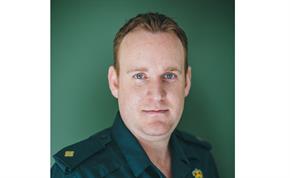
As part of our end of life care month, Emergency Care Practitioner Stuart Woolley is here to discuss his experiences.
Within the UK we all have the right to certain standards within the healthcare system regardless of age, gender or race, for example: hydration, food and communication about our care and access to information and The majority of our work is unscheduled care including managing critically ill patients, low acuity primary care patients and patients requiring our help in time of distress and unease.
Palliative and end of life emergencies usually present to our clinicians out-of-hours or when patients and families simply don’t know what to do. Our input at this time is key to helping them achieve the best standard of care we can possible offer. This is usually done through our biggest asset - communication.
Late last year, I was dispatched to assist a family whose father was in the active dying stages – a natural and expected phase of his illness. I was introduced to a pleasant man who had been diagnosed with oesophageal cancer with lymph metastases. He had been told to expect to start developing haemoptysis as part of the ‘process’. They were left with a bag of medicines and told to call for help if needed. That morning he did exactly that and his wife called 999 in a state of distress.
The majority of the time, patients with haemoptysis require immediate lifesaving intervention, but I was given a booklet containing his care plan, the medicines and a plea from his wife for help. She made it perfectly clear that she didn’t understand anything that was mentioned to her, although she had been communicated with. She simply couldn’t understand and now needed help. I was presented with someone who needed help but not life-saving care; someone who needed strong painkillers but not A&E; someone’s wife who needed information but in a format she could understand. He developed acute secretions and ‘breakthrough’ pain that needed managing.
After 20 minutes, he was comfortable and breathing with ease, and in a more stable condition to continue his care at home. He was, most importantly, pain free.
Above all the skills that we possess as pre-hospital clinicians, communication will be our biggest asset. In this incident it was clear the family didn’t understand the ‘process’, the medications and who to contact And many times people phone 999 exactly for this reason. It’s important that we make our communication with both the family and patient as clear as possible:
Don’t use euphemisms: Be honest and accurate – it’s ok to use words like ‘die’ or ‘dying’.
Use body language: Keep eye contact with the patient and family – this will build up mutual trust.
Silence can be good: It allows the family and patient time to process information, think about responses and can encourage them to open up more.
Ask for help: These will be extremely challenging situations, even for experienced practitioners. Do not be afraid to ask for help – search for contact numbers (clinical advice line, hospice, and GP specialists). The help is there; take your time to contact them for advice.
The active dying stages will be an ever-changing situation and you’ll need to monitor them closely. It can be a long job but constant communication is vital to ensure the family, patient and the clinical team understands what’s happening.
Following an incident, it can exacerbate a variety of emotions. It’s important that we take care of ourselves as well. Please utilise the support systems the Trust have in place for this, either through your line manager or contacting the employment assistance programme confidentially.
Stuart Woolley
Emergency Care Practitioner
Emergency Clinical Advice & Triage Centre – Chelmsford EOC
The Trust’s employee assistance programme is available at any timeand can be accessed either on the phone or online. Just visit www.well-online.co.uk (user name: EEASTlogin, password: wellbeing), or call 0800 085 1376.
Published 14th April, 2017